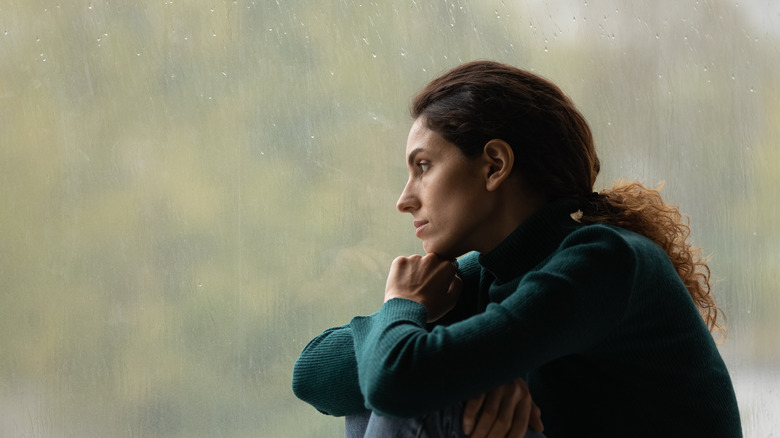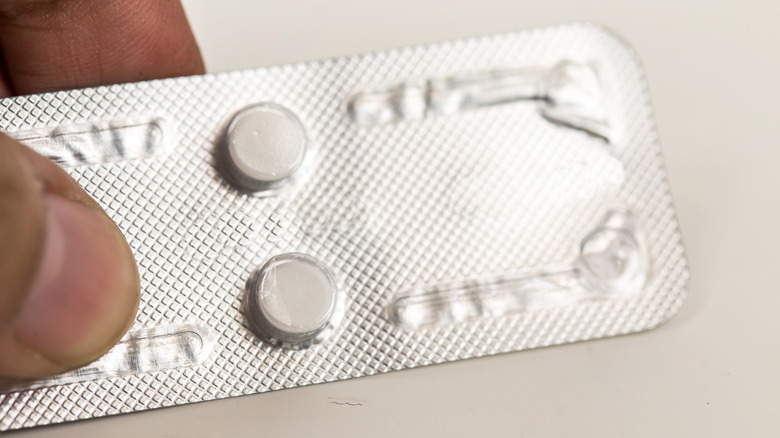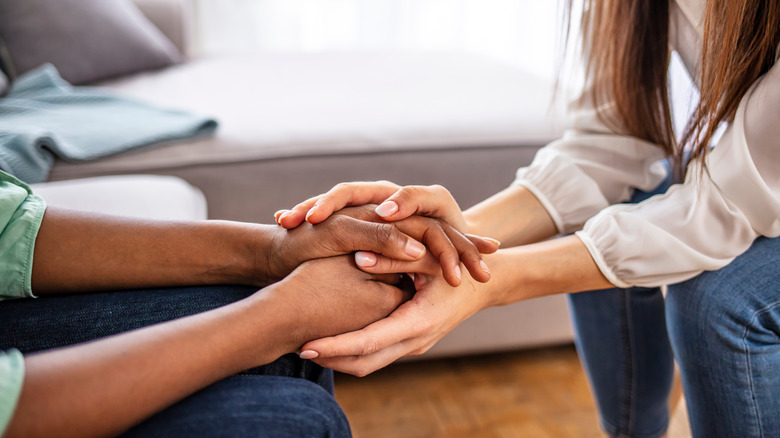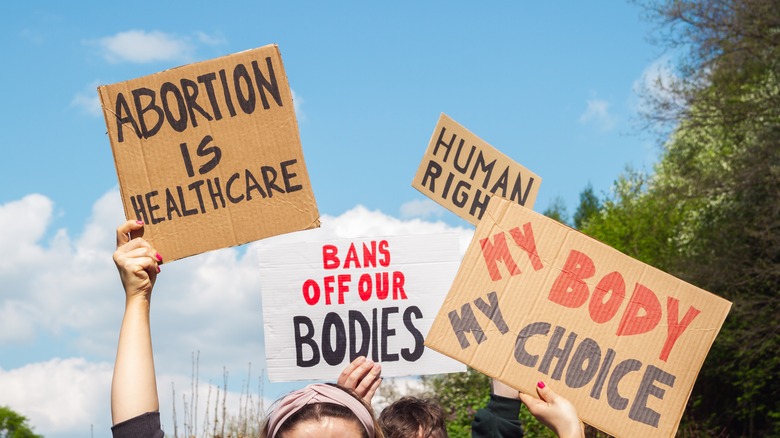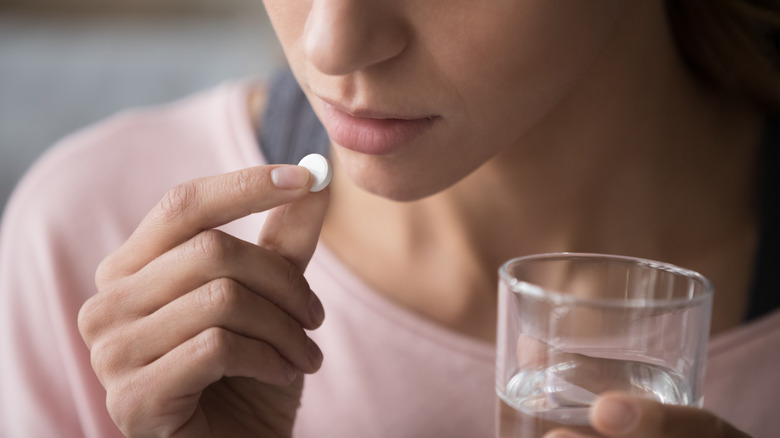Inside The Secret Network Of Activists Bringing Abortion Pills Into The US
If you're familiar with 1987 classic "Dirty Dancing," you've probably got caught up in that grand finale where — spoiler alert — Johnny and Baby finally nail their big lift. But Baby wouldn't have even had to get (literally) swept up by Johnny if Penny, his original dance partner, had been able to get a legal abortion. As actor Jennifer Grey reasoned, "Dirty Dancing" is a feminist movie because of how frankly it deals with the controversial topic.
The movie continues to send a powerful pro-abortion message as it follows Baby not only going to her dad for money to help Penny but also when Penny's illegal abortion leaves her requiring urgent medical care. For many people, especially now that Roe v. Wade has been overturned, Penny's story may be their future reality. After all, studies have shown that banning abortion doesn't stop it from happening — it simply prohibits safe abortions.
Volunteer groups across the United States and Mexico have been working together to provide pregnant people with access to safe abortions for years. Pills are handed off at parks, or shipped discreetly through the mail, allowing pregnancies to end privately rather than in a stranger's apartment (via WGBH).
According to the U.S. Food and Drug Administration, pregnancies under 10 weeks can be terminated using a two-step pill system consisting of mifepristone and misoprostol. However, despite being safer, there are still risks associated with it.
The history of underground abortion networks in America
The Washington Post reports that, while wider access to abortion medication has helped build up an extensive underground abortion network, there are still significant legal risks for everyone involved — risks that volunteers notably say are totally worth it. The system, though, is far from perfect and it's one many abortion activists are already intimately familiar with.
At least one underground abortion network has been in place since long before Roe v. Wade legalized the procedure in 1973. Called "the Jane Collective" or just "Jane," NPR confirms the group was founded in 1965, in Chicago, by Heather Booth, who was only 19 when she started helping women secure abortions. When Jane first started, the group was connecting women to doctors who would provide the procedure, since surgical abortions were the only option for ending pregnancies at the time.
"It's a fairly painful procedure," acknowledged Sunny Chapman, who was 19 when she was led into an apartment — blindfolded, no less — to terminate a pregnancy on a stranger's bed (via WGBH). Three years after Jane began connecting pregnant people to doctors willing to perform illegal abortions, the New York Times reports members of the Jane Collective began performing the procedures themselves, no longer willing to subject women to judgmental male doctors.
What Booth and the other members of the Jane Collective were hoping to do was make a dangerous medical procedure safe and available to those who needed it without shaming them in the process.
The abortion activist group working to help pregnant people in America
Today, many of the volunteers from the Jane Collective are still active in the pro-abortion movement, especially now there is a renewed need for clandestine services like the ones they started out providing. But with the discovery of mifepristone's abortive properties, abortions are now easier and safer — as long as patients can access the medication, of course.
A week before Mexico decriminalized abortion, in the fall of 2021, Texas issued a near-total abortion ban "except in the case of the life of the mother." A study published in the New England Journal of Medicine shows that, more often than not, this means the pregnant person must be "on death's door" before doctors are legally allowed to provide lifesaving medical care.
Since then, abortion activist groups in Mexico, like Las Libres, have been tirelessly working with volunteers in the United States to get pregnant people mifepristone and misoprostol, per the Washington Post. What's important to understand is that, according to the New Yorker, in Texas even giving someone a medical abortion is considered a felony, with a guilty conviction resulting in years of jail time.
Texans are also able to sue their neighbors for "upward of ten thousand dollars" if they suspect them of receiving or abetting an abortion. So providing pregnant people with pills, while arguably safer than performing a surgical abortion for both the volunteer and the patient, doesn't come without its own risks.
Verónica Cruz Sánchez and the history of Las Libres
For Verónica Cruz Sánchez, an abortion activist in Mexico, the risks have always been worth it. According to the Washington Post the group Cruz Sánchez founded, Las Libres, is expecting to help around 20,000 pregnant people in the United States in 2022 alone. Providing access to abortion medications is something Cruz Sánchez has become incredibly adept at. When she first started Las Libres in 2000, her goal was to help "Mexican women in desperate situations."
Back then, it meant helping to free women who had been jailed for their abortions. The group also provided abortion pills to those who needed them, free of charge. Cruz Sánchez grew up only hearing abortions and miscarriages referred to by euphemisms. "Malas camas," her mother would call them, which the New Yorker explains means "bad beds" in English. In Guanajuato, where Cruz Sánchez grew up, you faced up to three years in jail if you had or helped perform an abortion.
With Las Libres, she hoped to provide a space where abortion, miscarriage, and pregnancy could all be discussed openly and with the necessary sensitivity. Today, Las Libres is an international operation, which still offers free medical abortions. Their scope has expanded in the wake of new abortion bans too, with groups working on both sides of the border to smuggle the necessary medication into the United States.
How illegal abortions are happening in the United States today
Las Libres and groups like it source their medications through donations, manufacturers, pharmacists, and even personal trips to the pharmacy since mifepristone is technically an anti-inflammatory medication available over-the-counter in Mexico (via Washington Post). It's only in larger doses that it causes abortions, a nuance for which new abortion bans haven't made room, naturally.
For many, between the lack of access to abortion and the restrictions in place even before Dobbs, needing to go underground to get an abortion isn't shocking. In fact, it's always been the norm. In 2017, almost 90% of counties in the United States where abortion was legal lacked the requisite clinics to perform them. The Kaiser Family Foundation found that even in places where abortion was technically legal, there were plenty of states that required one in-person office visit before abortion medication could be prescribed.
While Las Libres' work inside the United States is relatively new, underground abortion networks like the Jane Collective have been around since the procedure was first legalized in 1973. It may have taken until 2022 for the Supreme Court to overturn the decision made in Roe v. Wade, but according to The Atlantic, states have passed over 1,300 bills restricting abortion since it was originally made a constitutional right regardless. They're expected to continue to go up, with Politico reporting some conservatives even want a nationwide ban.
Other resources for those seeking abortions
Those looking for abortions reach out to people like Verónica Cruz Sánchez and her volunteers through a variety of channels. One of the downsides of the illegal operation is that having easily traceable communication puts the pregnant person and the volunteer in danger. Many, the New Yorker reports, make contact through apps like Signal that offer end-to-end encryption with messaging. Others either find volunteers or are found by them, through Reddit forums.
One woman who spoke with the Washington Post said she posted in one forum desperately asking, "PLEASE HELP!!!!!!!!" Within a few hours, someone had messaged back offering to send her abortion medication free of charge. Cruz Sánchez confirmed Reddit is a common space for pregnant people to connect with her volunteers. But she's also received phone calls in the middle of the night, while others find her through the grapevine.
Medical professionals, many of whom feel "muzzled" following state abortion bans, are also taking risks. One nurse revealed that, when the Dobbs v. Jackson Health Organization ruling came through, she instructed patients to look into websites like Plan C and Aid Access, online resources for patients looking to acquire "at-home" abortions.
Plan C even includes emotional support resources because, as PsychCentral warns, you may experience grief or depression in the immediate aftermath. However, according to the Turnaway Study (via ANSIRH), most women ultimately don't regret their abortions.
